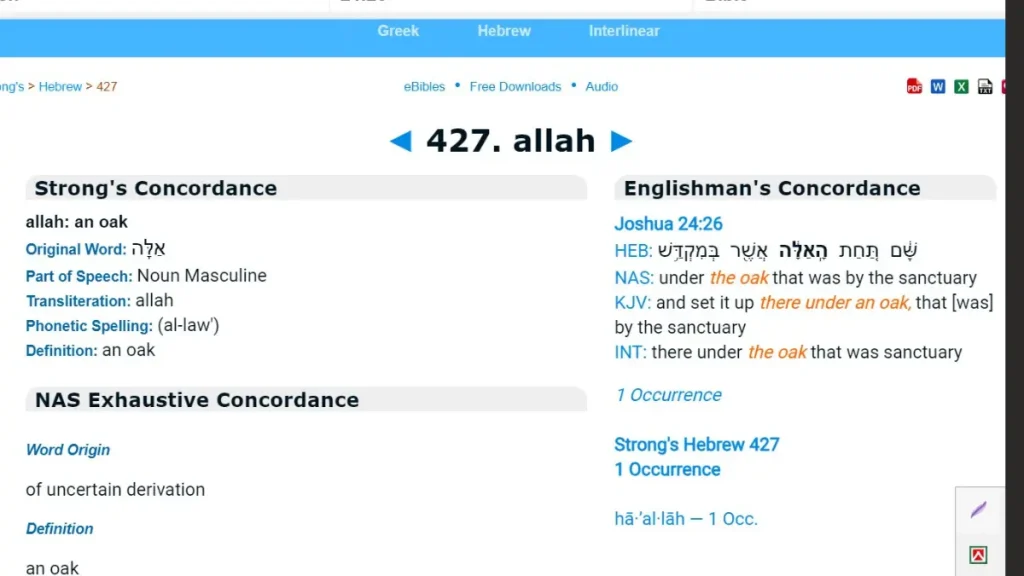In religious discourse, the concept of God stands as a central pillar, shaping the beliefs and practices of billions worldwide. Among the major Abrahamic religions – Judaism, Christianity, and Islam – the understanding of God varies in nuances yet shares foundational principles of monotheism. Central to Islamic belief is the notion of Allah, the Arabic term for God. While the King James Version (KJV) of the Bible, a cornerstone text for many Christians, does not explicitly mention Allah, a comparative analysis of the concept of God across these religious traditions sheds light on shared theological foundations and points of divergence.
Monotheism in Abrahamic Faiths
Abrahamic religion refers to the religion preached by the original Prophet Ibrahim. And Prophet Ibrahim affirmed monotheism, belief in one God. There are three types of Abrahamic religions known in the world today – Judaism, Christianity and Islam. But among these three, only Islam holds the ideal of Prophet Ibrahim. And the other two religions have gone astray.
In Judaism, God is referred to by various names, including Yahweh, Elohim, and Adonai, deceiving the Jewish people by their religious scholars. And they deviated from the original Abrahamic religion.
And Christianity has taken on a more sinister form. Because Prophet Jesus came to earth to strengthen the Abrahamic religion, that is, to strengthen the belief in the oneness of God. But after the death of Jesus, Christian scholars presented God as triune – God the Father, God the Son (Jesus Christ), and God the Holy Spirit. It is an idea that is born from their brain. It does not match the teaching of Prophet Jesus.
On the other hand, Islam emphasizes the absolute unity and oneness of Allah, rejecting the concept of partners or partners (shirk) with Allah.
The Word Allah in the Bible – Original Greek-Hebrew
The word ـللَّٰه is found in the Holy Bible – in the original Hebrew and Greek Bibles (corrupted Torah and corrupted Injil). Although the word Allah in the Bible means an oak tree, the Christian website Biblehub mentions in its explanation, Froms and transliteration instead of (hā’-allāh hā·’al·lāh haalLah) הָֽ-אלָּ֔ה האלה =Allah is God (Elah) means God.

BibleHub also admits – A variation of ‘elah (a variation of ‘elah’ ie a different form of the word but the same meaning) إله (ilah) in Arabic means-God, god, gods. You can check from this link.
Now let’s see what the New Testament says… In Greek = ἀλλά = Allah means only one, but here in Greek Allah is not understood to mean God. In the Quran, Allah says –
إِنَّنِي أَنَا اللَّهُ لَا إِلَٰهَ إِلَّا أَنَا فَاعْبُدْنِي وَأَقِمِ الصَّلَاةَ لِذِكْرِي
I am Allah (أَنَا اللَّهُ=ana-llahu) There is no god but Me.
So worship Me and establish prayer in remembrance of Me. The Arabic Bible says,
لَنْ أُحِلَّ بِكُمْ غَضَبِيَ الشَّدِيدَ، وَلَنْ أُدَمِّرَ أَفْرَايِمَ ثَانِيَةً، لِأَنِّي أَنَا اللهُ وَلَسْتُ بَشَرًا، أَنَا الْقُدُّوسُ فِي وَسَطِكَ، فَلَا آتِي عَلَيْكُمْ بِغَضَبٍ
Translation: I will not reveal my terrible anger, I will not destroy Abraham anymore, because I am Allah, (أَنَا اللَّهُ=ana-llahu) not a man; I am God in you. I will not bring anger.
Exploring Allah in The Bible KJV
Yes, Allah in the Bible KJV. While many people believe that the word Allah is not explicitly mentioned in the KJV of the Bible, the concept of God shares basic characteristics with the Islamic understanding of Allah.
Throughout both the Old and New Testaments, God is described as merciful, compassionate, just, and sovereign – attributes also ascribed to Allah in the Quran.
For example, in Psalm 86:15 (KJV), it is written, “But thou, O Lord, art a God full of compassion, and gracious, long-suffering, and plenteous in mercy and truth.” Similarly, in the New Testament, Jesus teaches about the mercy and love of God in passages such as Matthew 5:7 (KJV), “Blessed are the merciful: for they shall obtain mercy.”
Furthermore, both the Bible and the Quran emphasize the transcendence and omnipotence of God. In Isaiah 40:28 (KJV), it is stated, “Hast thou not known? hast thou not heard, that the everlasting God, the Lord, the Creator of the ends of the earth, fainteth not, neither is weary? there is no searching of his understanding.”
This echoes the Islamic understanding of Allah’s absolute sovereignty and power over all creation, as expressed in numerous Quranic verses, such as Surah Al-Baqarah (2:255), known as Ayat al-Kursi.
Distinctive Features
While there are similarities in the portrayal of God between the Bible and the Quran, there are also distinctive theological features that set them apart. One significant point of divergence is the Christian doctrine of the Trinity, which asserts that God exists eternally as three persons in one essence. This concept, while central to Christian theology, is not present in Islamic belief, which maintains strict monotheism.
Another difference lies in the portrayal of God’s relationship with humanity. In Christianity, the doctrine of salvation through Jesus Christ emphasizes a personal relationship with God, facilitated through the redemptive work of Jesus on the cross.
This concept of atonement and grace differs from the Islamic understanding, which emphasizes submission to Allah’s will (Islam means submission) and adherence to the teachings of the Quran and the example of the Prophet Muhammad.
Conclusion
The exploration of Allah in the Bible highlights both commonalities and distinctions in the portrayal of God across different religious traditions. While the term “Allah” may not be explicitly used in the KJV of the Bible, the attributes and characteristics ascribed to God bear resemblance to the Islamic understanding of Allah.
Through comparative analysis, we gain insights into the diverse ways in which humanity seeks to comprehend the divine and navigate the complexities of faith. Ultimately, such exploration encourages dialogue, understanding, and mutual respect among adherents of different religious traditions, fostering harmony in an increasingly interconnected world.







